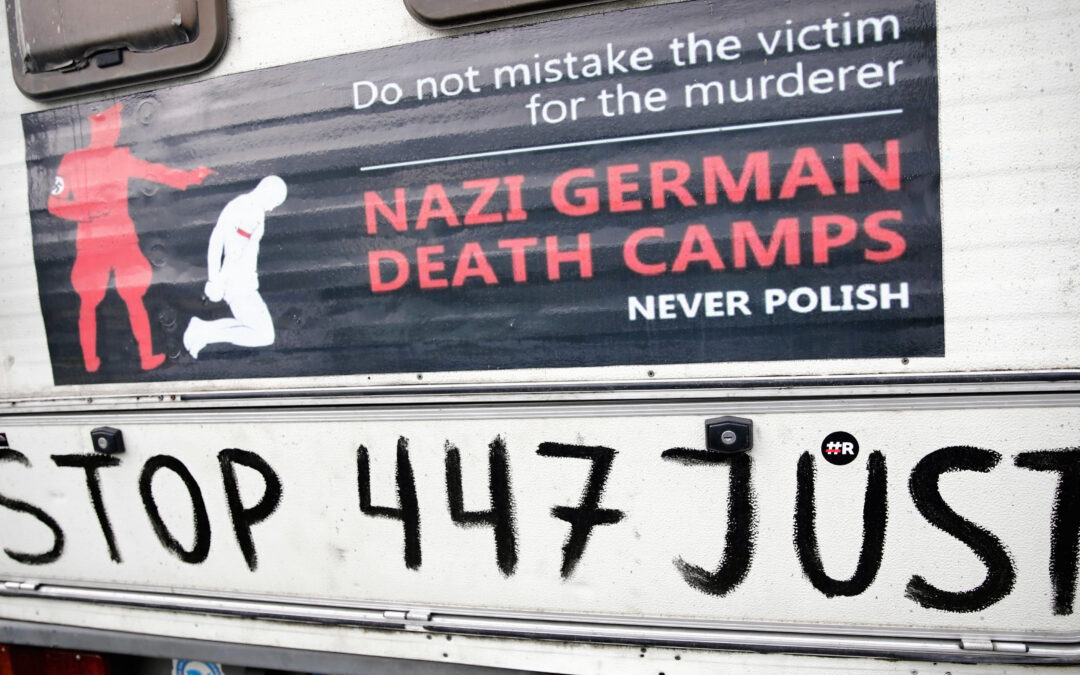The son of a former prisoner at Auschwitz has brought a complaint against Germany at the European Court of Human Rights (ECHR) over its refusal to enforce a Polish court ruling ordering a television station to apologise for calling the death camp “Polish”.
In 2016, the court of appeal in Kraków ordered German public broadcaster ZDF to apologise to Karol Tendera, who had been imprisoned at Auschwitz from 1943 to 1944, for describing it as a “Polish death camp”.
The use of that phrase has long caused anger in Poland, where many believe it suggests that Poles were responsible for the camps run by Nazi Germany in occupied Polish territory during the war (whereas they were in fact victims of them).
Germany using “systematic information activities” to evade WW2 responsibility, says Polish spokesman
In a civil action, Karol Tendera, whose case was supported by Poland’s human rights commissioner Adam Bodnar, argued that ZDF’s use of the term had violated his personal right to national dignity and identity.
The court agreed and ordered an apology. However, while ZDF did publish one on its website, it did not conform to the specifications of the court order.
That led to further legal proceedings in Germany, which eventually resulted in the Federal Court of Justice (BGH), Germany’s highest court, ruling in 2018 that the Polish verdict cannot be enforced in Germany as it would violate ZDF’s right to free speech.
A German court rules that a Polish court’s ruling that German broadcaster ZDF must post a specifically worded apology on its website for calling two World War II Nazi camps “Polish death camps” can’t be enforced in Germany https://t.co/XUZJWVkt9I
— Notes from Poland 🇵🇱 (@notesfrompoland) August 21, 2018
After the ruling, Tendera expressed an intention to take the case to the ECHR, but he died the following year at the age of 98. Now, however, his son Jerzy has filed a lawsuit at the Strasbourg court on his father’s behalf, reports TVN24.
Jerzy Tendera argues that the BGH, in refusing to enforce the Polish court ruling, violated articles 6, 8 and 10 of the European Convention on Human Rights. He also notes that the BGH has previously refused to protect the free speech of those who deny or distort the history of the Holocaust.
“This is about making statements consistent with historical facts and preventing falsification of the truth about the Holocaust,” Tendera’s lawyer, Lech Obara, told TVN. “German judges…[are] protecting statements that deny or distort the memory of the Holocaust.”
ZDF has also been subject to a separate long-running legal action in Poland in relation to its portrayal of World War Two history. In 2016, 92-year-old Polish Home Army veteran Zbigniew Radłowski filed a civil case against the broadcaster over its drama series Generation War (Unsere Mütter, unsere Väter).
Radłowski argued that the series unjustly portrayed Polish resistance fighters as antisemites. In March this year, a Polish appeals court upheld an earlier ruling that ZDF and UFA, which produced the series, must apologise to Polish war veterans for violating their personal rights.
After that ruling, ZDF – which argues that its “portrayal of Polish characters in no way constituted a minimisation of historical fact nor of Germany’s responsibility” for wartime crimes – immediately announced that it would assess avenues for a further appeal, reported Deutsche Welle.
Main image credit: Jakub Porzycki / Agencja Gazeta

Daniel Tilles is editor-in-chief of Notes from Poland. He has written on Polish affairs for a wide range of publications, including Foreign Policy, POLITICO Europe, EUobserver and Dziennik Gazeta Prawna.




















